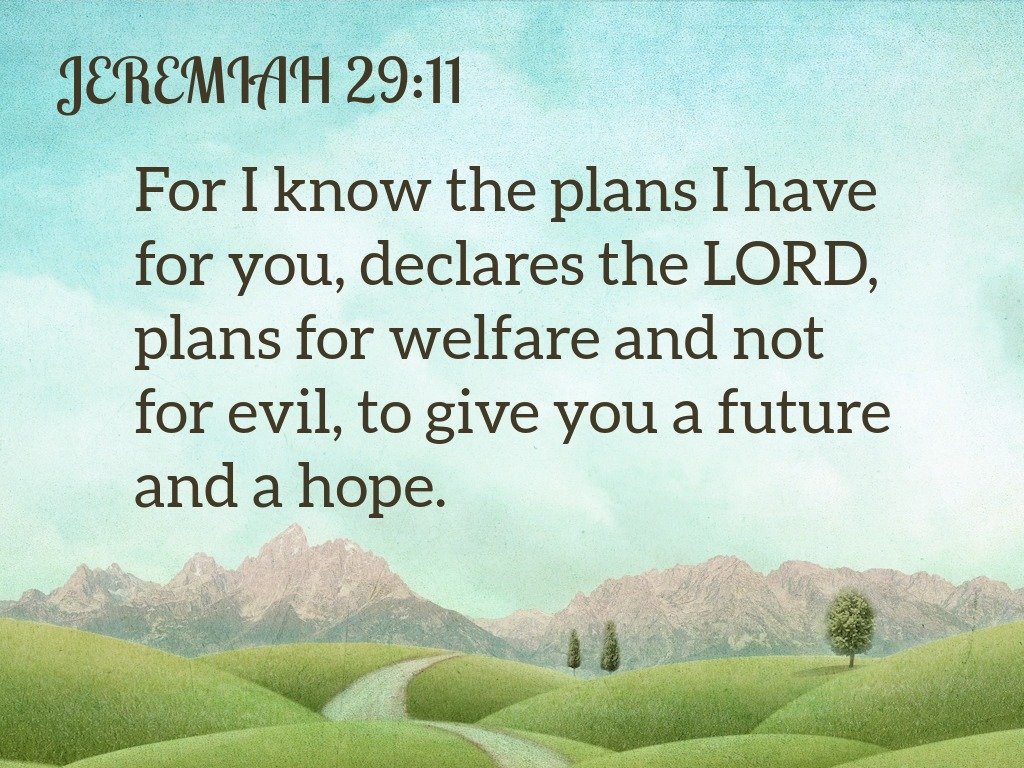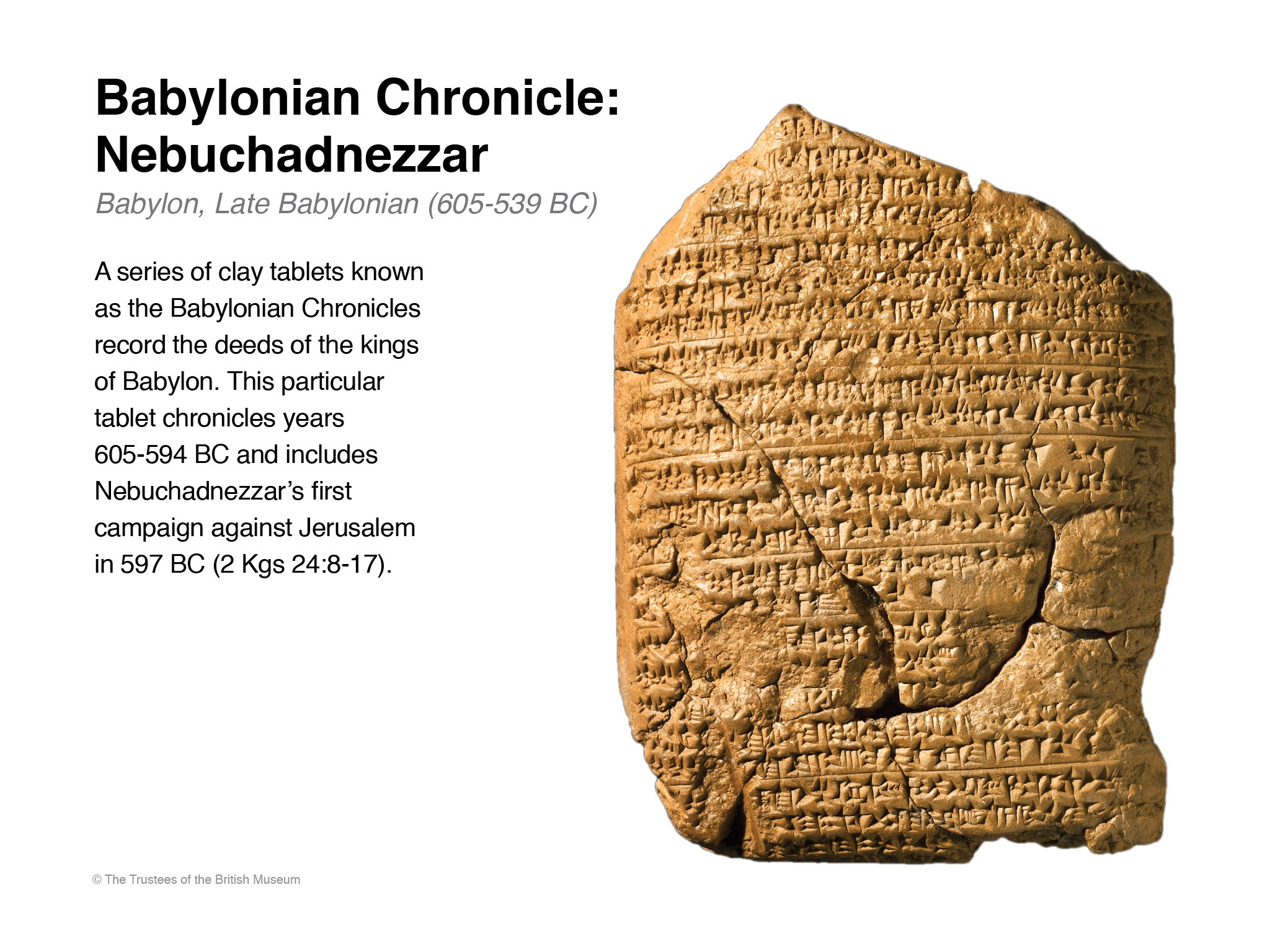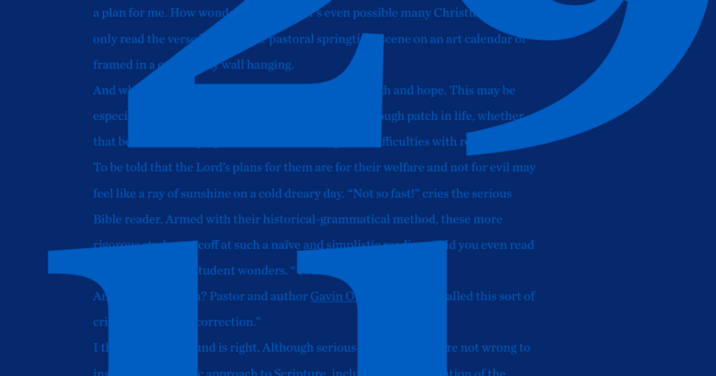For I know the plans I have for you, declares the LORD, plans for welfare and not for evil, to give you a future and a hope.
—Jeremiah 29:11 (ESV)
Who is God’s promise for? Casual readers of the Bible may read this popular verse and think, “Wow! God has a plan for me. How wonderful that is!” It’s even possible many Christians have only read the verse beside some pastoral springtime scene on an art calendar or written in calligraphy.

And why not? The passage seems to offer such warmth and hope. This may be especially true for someone who has been hitting a rough patch in life. To be told that the Lord’s plan is for your welfare and not for evil may feel like a ray of sunshine on a cold dreary day.
“Not so fast!” cries the serious Bible reader. Armed with their historical-grammatical method, these more rigorous students scoff at such a naïve and simplistic reading. “Did you even read the context?” this student wonders. “You’re not Israel!”
An over-correction?
Pastor and author Gavin Ortlund recently called this sort of criticism an “over-correction.”
Here’s a somewhat controversial take: it is fine to apply Jeremiah 29:11 to the individual Christian in various qualified ways, and many of the reactions against this are over-corrections.
— Gavin Ortlund (@gavinortlund) January 16, 2023
I think Pastor Ortlund is right. Although serious Bible students are not wrong to insist on a methodic approach to Scripture, including a consideration of the historical context in which it was written, the Old Testament texts are given to us for our instruction today (2 Tim 3:16). How, we may wonder, should we balance a sound reading of the Bible with more immediate application?
The answer is found not so much in “balance” as in considering the proper steps to application.
God’s plans are for Israel
The insistence on reading any passage of the Bible with its context in mind is a good thing. Knowing what something meant when it was written is the first key to knowing what it means now.
Imagine you’ve been sorting through the dusty boxes in your mother’s attic and come across an old faded letter. On the back of the envelope are the words, “I love you and everything about you.” How would you know what this means?
Naturally, the first thing you’d ask is, “Who wrote the letter and to whom was it addressed?” Was it written by your grandfather to your grandmother? From your grandmother to your mother? Or is it a letter to your grandmother from a boyfriend she had prior to marrying your grandfather? The answer to this question will greatly determine how you understand the statement.
A letter from a prophet
Jeremiah 29 is a letter. It is written by Yahweh’s prophet to those taken into exile in Babylon, carried away with King Jehoiachin by Nebuchadnezzar after the first siege of Jerusalem (cf. 2 Kgs 24:10–17; Jer 29:1–3). Although the city, with its walls and Solomon’s Temple, was still standing, its glory had greatly diminished. Jeremiah’s letter comforts the exiles, even while telling them of darker days on the horizon.

The prophet Jeremiah’s letter did not give the exiles the news of immediate rescue that they wanted to hear. They would have preferred a message like that of the false prophet Hananiah, who predicted an imminent return to the land (Jer 28:1–4). But Jeremiah’s message to them was, “Sit tight, you’re going to be there for a long time—seventy years, in fact. It’s time to build houses where you are” (Jer 29:4–10).
And yet, this was not the end for them. They could have hope for the future, for God promised that their exile in Babylon was going to work out for their good. God’s greater plan for his people was “plans for welfare and not for evil,” for those who would seek God (Jer 29:12). When they seek him, then will their fortunes be restored. When seventy years are past, God promises he will visit his people and bring them home.
God’s plans are for Jesus Christ
The exile of Judah and their return to the land served God’s great plan of redemption. It spread the Jews across the face of the whole empire, where faithful Jews like Daniel and his friends became witnesses to the Gentiles. Their presence in the world advanced God’s promise to Abraham that through him all nations would be blessed (Gen 12:3).
But all the promises of God, from the beginning of time to Jeremiah’s encouragement of restoration to the exiles, ultimately find their “Yes” in Jesus Christ (2 Cor 1:20).
Jesus is True Israel
Jesus re-lives the history of his people, but in faithful obedience where they rebelled and failed. His life strikingly recapitulates the life of Israel:
- He is Abraham’s Seed, the promised son, the new Isaac (Gal 3:16).
- “Israel is my firstborn son,” says Yahweh (Exod 4:22); but it is Jesus, the true Israelite, who is declared firstborn of all creation (Col 1:15).
- Israel was a nation under the Law, but did not keep it (Acts 7:53); Jesus was born under the Law and was perfectly faithful (Gal 4:4–5).
- In Hosea 11:1, God calls his son, Israel, out of Egypt; but Matt 1:15 shows how Jesus’s flight from the Pharaoh-like Herod fulfills the prophet’s word.
- As a new Moses on a mountain, Jesus gives a transformed Law for a people whose heart has been changed from stone to flesh (Ezek 36:26–27; Matt 5:1—7:28).
- As the true Joshua, Jesus goes before his people in his Jordan baptism, leading the way to the kingdom (Josh 3:14–17).
- After this, he endures forty days of testing in the wilderness (Matt 4:1–3), recapitulating Israel’s forty years of wandering (Deut 8:2–5).
- Finally, Jesus carries the sin of God’s people on the cross, bearing the curse of, and identifying with, rebellious Israel (Deut 21:22–23; Gal 3:13).
Sinful Israel was like a valley of dry bones (Ezek 37:11–14); their exile in the nations was pictured in the death of being swallowed by a great monster of the sea (Jonah 1:17).1 Jesus was likewise swallowed up by the tomb for three days in his exile of death, but God restored him to life through the resurrection of Easter morn.2
God’s plan really is for you
What does Jeremiah 29:11 mean for you in light of these glorious truths?
Returning to our letter in the attic, suppose you found upon opening it that it was from your grandmother to your mother, written in celebration of the news that she was expecting a baby—you. The letter still would not be to you directly, but its message of love and care would apply to you no less than to your mother.
Jeremiah 29:11 is good news if you are united by faith to Jesus Christ, the true Israelite. In Christ, God’s promises for Israel are for you as well.
Romans 6:3–11 shows that being united to Christ through baptism in the Holy Spirit means that you participate in his death and burial (exile), which entails the promise of your resurrection (return from exile) and abundant life in his presence.
Furthermore, God promises us that “for those who love God, all things work together for good” (Rom 8:28). This echoes the promises given in Jeremiah 29:11. Even in Israel’s exile, God’s plans for their good stood firm.
God’s purposes for his people stand just as firm today. No exile, not even an exile of death, can separate you from the hope you have in God (Rom 8:38–39). Since Jeremiah 29:11 was written to reassure people forlorn in Babylon of God’s intentions for their good, you also can trust God in full assurance that no trial or hardship (even those of your own doing!) can put you outside of God’s plan for your ultimate good.
If you are in his Son, Jesus Christ, then Jeremiah 29:11 is for you. God’s plan for you is for your ultimate good, because your future and your hope are in Jesus Christ.
Related articles
- 29 Bible Study Tools for Reading the Bible More Effectively
- How to Search Original Languages for Word Meaning with Logos
- Two Jeremiah Scrolls? The Perplexing History of Jeremiah’s Composition
- For the “sea” as representative of the Gentile nations, see Isa 9:1; 17:12–13; 60:5; Luke 21:25.
- For more on this, see Jesus as Israel, the two-volume commentary on the Gospel of Matthew by Peter J. Leithart.







